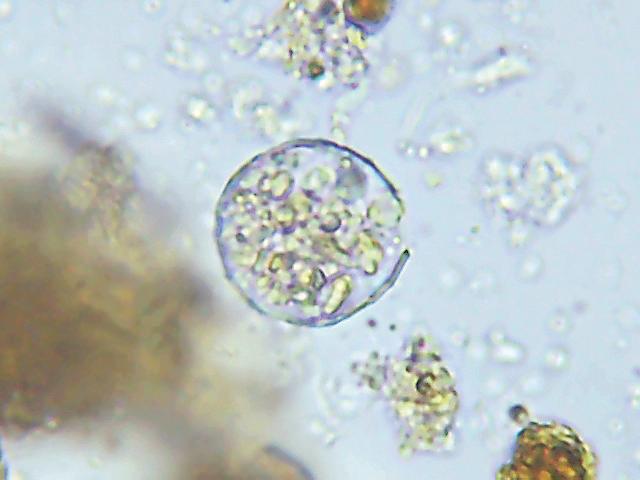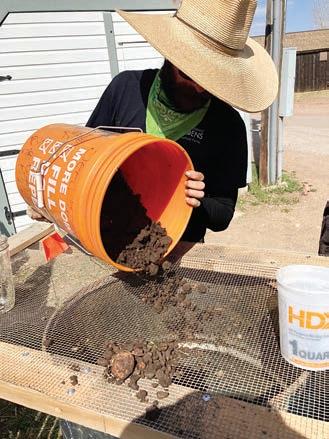
6 minute read
Soil health at Chatfield Farms

Farmers do everything. ey are mechanics, botanists, naturalists, athletes and some even believe themselves to be meteorologists. In the age of the regenerative agriculture movement, farmers need to become biologists, or more speci cally, soil ecologists.
Soil ecology is the study of the seemingly limitless universe beneath our feet. In just a teaspoon of healthy soil, there are over one billion bacterial individuals and more than six miles of fungal mycelium. It would take seven years to recite the names of all the bacterial species in a compost pile. How do the trillions of soil microbes interact? It’s likely we’ll never truly know. A broad understanding of the soil ecosystem, however, can change a farmer’s mindset.
e most productive soil in the world from an old growth forest contains far less plant-available nutrients than are recommended for agricultural soil. How could ‘nutrient-de cient’ soil — teeming with soil microbes — produce the largest plants on the planet?

Nutrients are released when microscopic predators consume bacteria. Nematodes, protozoa and microscopic insects ‘poop’ out nutrients that plants are able to consume. Plant roots absorb those nutrients through a web of fungi. Fungal networks expand the reach of roots and create highways inside root hairs. As satis ed plants then release ‘exudates,’ which attract more bacteria and fungi, the cycle continues. Without these characters to play their parts, soil turns into lifeless dirt.
Conventional soil management has disrupted the soil ecosystem. Without microscopic predators, bacteria or fungi to assist plant roots, farmers are forced to overfeed plants with fertilizers. e excess nutrients that aren’t washed away are consumed by a monoculture of bacteria, reproducing rapidly and unchecked

Married Teresa Ann Browning of Colorado Springs, Colorado on July 31, 1993, and had two sons: Samuel Garrett Burden (2/4/1996), now living in Arvada, Colorado, and Benjamin omas Burden (6/25/1999), now living in Highland Ranch, Colorado. Divorced 2005.

His career entailed practicing Veterinary Medicine, Consultant in the oil and gas industry, Tech entrepreneur & much more. He loved the outdoor activities of living in Colorado. His hobbies included skiing, biking, camping, y- shing, upland bird hunting, golf, and outdoor playing and hiking with his beloved dog Sophie.
GUEST COLUMN Rutger Meyers by predators. Without predators to consume bacteria, the soil ecosystem becomes unbalanced. e resulting population of disease-causing bacteria release greenhouse gases into the atmosphere. e Burden Family moved from Denver to Kittredge in 1965, then to Evergreen in 1966 where Kevin attended Wilmot Elementary, Evergreen Junior High and graduated from Evergreen High School in 1981. Kevin then attended Colorado State University, Fort Collins, where he attained a Bachelor of Science degree in Animal Biology with a minor in Biochemistry (1986). Kevin then earned a Doctor of Veterinary Medicine degree, also from Colorado State University, Fort Collins (1991).










Realistically, not all farmers have the time to study microscopy. rough the eyes of a microscope, a farmer can witness the soil ecosystem in action, but studying soil ecology doesn’t require a microscope. Diversity in critters — worms, ladybugs, roly-polies, etc. — is an indication of a balanced biology. Even without a microscope, understanding what healthy soil looks, feels and smells like can inform better practices. Undisturbed soil will evolve with its plant inhabitants. Rich brown, textured soil that smells like a forest will feed a vegetable plant on its own, without nutrient additives. A calculated ‘less is more’ soil management approach gives our soil a chance to breathe.
Regenerative agriculture rede nes the farmers’ relationship with nature. Humans’ senses have evolved with plants — the smell of healthy soil triggers serotonin production in the human brain. Alternatively, our negative reaction to the putrid smell of greenhouse gases produced by harmful bacteria warns us of toxicity. ese ne-tuned deep intuitions can become regenerative farmer’s almanac.
By working in tandem with natural soil ecosystems, farmers can reduce the labor and expenses of disruptive soil tillage and chemical fertilizer application. Soil naturally wants to grow plants. By accepting help from nature, farmers can grow healthier plants more e ciently.

A Celebration of Kevin’s Life was held on March 18, 2023, at 2459 Inverness Place, Evergreen, Colorado, which included numerous family members and friends. He will be dearly missed by family members and friends. To leave condolences for the family please visit www.evergreenmorialpark.com
Three suspects in rock-throwing murder face 13 charges resident Bartell was driving northbound along Indiana Street when a rock crashed through her windshield and sent her vehicle hurtling from the roadway. Bartell was talking to a friend on the phone at the time and was found dead when the friend traced her location.
BY RYLEE DUNN RDUNN@COLORADOCOMMUNITYMEDIA.COM e three 18-year-olds suspected of killing Alexa Bartell during a rock-throwing rampage on April 19 were o cially charged by the O ce of the First Judicial District Attorney on May 3. e trio face 13 charges including rst-degree murder and assault and are being held without bond.

Twenty-year-old Arvada
FROM PAPERBOY e three suspects were set to appear in court at 1 p.m. on May 3 for the return ling of charges.
Nicholas Karol-Chik, Joseph Koenig and Zachary Kwak all face the same 13 charges: one count of murder in the rst degree, six counts of criminal attempt to commit murder in the rst degree, three counts of assault in the second degree and three counts of criminal attempt to commit assault in the rst degree.
“Well sir, it’s seven cents for the daily paper and twenty- ve cents for the Sunday.”
“Okay,” he said as he nodded his head. He stuck his hand inside his trouser pocket and shook it. I could hear change jingling in it. It drew my attention. My eyes focused on it. He smiled mischievously. “I’ll tell you what. I’ll pay you sixty-seven cents, or you can have all the coins in my pocket. If it is less than sixty-seven cents, you lose. If more, you win. Wadda ya say?”
I pursed my mouth as I stared at his pocket with the jingling coins. My eyes lit up in anticipation, and I drooled as I imagined hitting the jackpot. I regained my resolve, looked him squarely in his eye, and sti ened my jaw.
“Okay. I’ll take what you have in your pocket.”
He grinned widely and pulled out the change. It was a handful.
“Smart kid, Hold out your hand.”
I cupped both eagerly as he dropped a cache of nickels, dimes, and quarters, into them. “You’ll go far,” he laughed as he did. Later, I gured it was well over three dollars since I kept a running total in my head about the amount of tips I collected.
Tips were, like they are for many service workers today, the lifeblood of my income. at was compounded at Christmas. Almost everyone gave me a card with a buck or two in it. A few times I’d hit the jackpot with a ve-dollar bill. Most of it went into my rst savings account my mother helped me open at the Pittsburgh National Bank branch in the Miracle
Alexa Bartell
Mile Shopping Center. I still remember handing my earnings to Mrs. Williams, the teller with white hair and big glasses. She always would tell me how proud she was of me as she entered the amount into my savings account booklet.
Not all of my customers were engaging. In fact, there were a few I never met. I just knew they got the newspaper and would faithfully leave what they owed me, most often with a tip, in an envelope inside their storm door or paperbox. At rst I thought it was creepy, but I came to understand that some people were very private or mysteriously reclusive, and that was okay.
I had one customer, though, who taught me what a deadbeat was. Mrs. “Bond” got the Sunday paper only. When I took over the route, she would leave me a dollar—no tip—for a month’s payment inside the door. One month the money wasn’t there. I gave it a couple of weeks, but still no money. e next Sunday, early in the morning, I knocked on her door. No answer. I left the paper but decided to give her one more chance. e following Sunday, I knocked again. Still no answer. at time I had written a note, which I left with the paper, saying she was two months behind and that I needed two dollars the following Sunday. at next Sunday, no money, so I left no paper. Nor did I deliver one for the next couple of weeks.
Finally, my route manager, John, asked me why I wasn’t delivering her a paper. Apparently, she called and complained. I explained why. He said I had to deliver her a paper. I said I wouldn’t until she paid up. I told him it wasn’t right or fair and that I had given her several chances. We were at a standstill, but I stood my ground. It was an early lesson night brushed across my face. I can still smell the sweetness and hear the stillness. As a nascent teenager, I wasn’t conscious about morning energies, but I now realize that I was already intuiting something profound.
I picture that big-eared kid with stringy brown hair wearing cuto jeans for shorts, a T-shirt, and dirty white canvas sneakers with tapedtogether eyeglasses sitting crookedly atop his nose trooping along with an o -white canvas sack hanging from his shoulder and a wire connecting his ear to a transistor radio tuned into KQV and grooving to the Four Seasons and Beach Boys. And when I do, I o er gratitude to the Universe for having been blessed by having that opportunity.
My life has been spent in peopleoriented jobs that began with delivering newspapers. Today, as an essayist and an author of literary ction, I focus on the human psyche: Why people do what they do. It was as a paperboy I began learning those dynamics. And the lessons I learned are a rmed today. Yes, there are deadbeats, losers, and mean, un-










